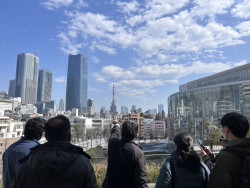
December 5, 2013
December 6, 2013
Food mislabeling scandals, award-winning Japanese chocolate and predicting pop hits
By Metropolis
Originally published on metropolis.co.jp on December 2013
USELESS GESTURES
- In response to a series of scandals involving mislabeled food at hotel restaurants, the Japan Association of Chinese Cuisine has urged its members to “change their crustacean-naming conventions.”
- A plutonium test conducted by the US between July and September drew a letter of rebuke from the mayor of Nagasaki, who said the move was “completely unacceptable.”
- Officials at McDonald’s issued an apology after managers at one of their restaurants in Western Tokyo posted a notice “refusing entry to homeless people.”
- The All Japan Chefs Association invited 50 senior citizens in Tokyo to enjoy “a top-class French meal cooked by chefs who work at prestigious hotels”.
THAT TIME OF YEAR

- The government presented its autumn decorations to 4,193 Japanese people and 49 foreigners for their contributions to society.
- This being Japan, only 347 of the recipients—or 8.3 percent of the total—were women.
- Among those honored were a lantern maker, a researcher of organic electroluminescence and “the developer of Vocaloid character Hatsune Miku.”
- The youngest recipient was 26-year-old Yan Jun, a Chinese citizen living in Osaka who saved a young Japanese boy from drowning during a typhoon in September.
MILESTONES
- Researchers at Kinki University have developed a method for manipulating a computer mouse via “a tube held in the mouth.” It’s hoped the breakthrough will help people who have limited use of their hands.
- Two Japanese chocolatiers were among 12 people to win top honors at the Salon du Chocolat competition, held last month in Paris.
- A professor at Tottori University has devised a formula that can be used to predict hit songs. It’s based, among other things, on how frequently the tunes are mentioned in the media “and changes in the number of comments made on the internet.”
- Officials at Oigawa Railway in Shizuoka will operate a steam locomotive “in the guise of Thomas the Tank Engine” for two months next summer.
FOREIGN DISASTER DAYS
- In Niigata, a veterinarian and an animal trainer have teamed up to compile a guide “for people who plan to evacuate with their dogs if a major disaster hits.”
- Officials at the Board of Audit have found that 23 percent of funds earmarked for reconstruction in northeastern Japan have been used for projects not directly related to recovery.
- Finance ministry officials have announced that, by next October, the government will begin collecting sales tax on e-books and music purchased from overseas websites.
- TMG officials say they’ll take a cue from London Olympic organizers and adopt a “multi-headed organizational structure” in preparing for the 2020 Games.
AND FINALLY…
- According to a survey by food manufacturer Nisshin, nearly half of Japanese housewives cook traditional cuisine more frequently than they did ten years ago.
- Officials at Mitsubishi Heavy Industries are discussing a deal with authorities in Ankara to jointly develop tank engines for the Turkish military.
- Meanwhile, the Diet passed a bill that allows armed security guards “to be onboard Japanese vessels in waters off Somalia and nearby areas to fight piracy.”
- Bottom Story of the Week: “Nursing Clothes Manufacturer Lets Interns Bring Their Children to Work” (via Mainichi Japan)
Compiled from reports by AP, Japan Today, The Japan Times, Jiji, The Tokyo Reporter, The Mainichi, The Japan News, AFP, Reuters and Kyodo







